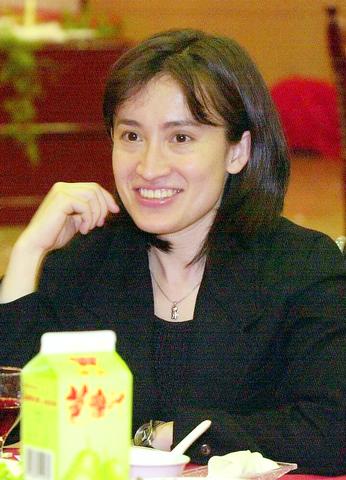Hsiao Bi-khim (
Hsiao said that if elected as a legislator, her dream to work for Taiwan would be fulfilled, and that the nation would benefit from her expertise in foreign relations.

PHOTO: TAIPEI TIMES
"Through my education and growing experience ... I have established the groundwork for my choice to work in the political arena in Taiwan," Hsiao said at Tainan Theological College and Seminary (台南神學院), where her father served as the school's president.
"I chose to come back to my home city of Tainan to announce a very crucial personal decision -- that is, to join the DPP primary in a bid to run for a seat representing overseas Chinese communities."
Hsiao has been a focus of media attention over recent months after allegations surfaced in November that she and the president were having an affair.
Subsequently, she was attacked by opposition lawmakers for holding a post at the Presidential Office and at the same time retaining dual citizenship. At yesterday's press conference, she said she felt frustrated at these recent incidents and had thought of withdrawing from her career in politics.
"I take my work very seriously, but I did not expect that my low-key job as a presidential aide would draw such ferocious attacks from the opposition. Facing the storms of criticism, I thought of dropping out of politics," she said.
"But in retrospect, I know what we enjoy today is the result of the painstaking efforts made by our senior politicians.
"Now I feel I should not give up, and instead should take more concrete actions to fulfill my ideas to serve my country."
Having worked at the DPP's Department of International Affairs she currently is employed as an advisor to the president on diplomatic policy.
Hsiao said she has gradually proved her capabilities in dealing with international relations, and now thinks that helping the government win a greater standing in the international community is one of her key goals.
The DPP's Chiu I-jen (
Chiu said he appreciated her professional skills in diplomacy and hoped that Hsiao could find new ways to broaden Taiwan's international relations.

The Ministry of the Interior (MOI) is to tighten rules for candidates running for public office, requiring them to declare that they do not hold a Chinese household registration or passport, and that they possess no other foreign citizenship. The requirement was set out in a draft amendment to the Enforcement Rules of the Public Officials Election and Recall Act (公職人員選舉罷免法 ) released by the ministry on Thursday. Under the proposal, candidates would need to make the declaration when submitting their registration forms, which would be published in the official election bulletin. The move follows the removal of several elected officials who were

The Republic of China (ROC) is celebrating its 114th Double Ten National Day today, featuring military parades and a variety of performances and speeches in front of the Presidential Office in Taipei. The Taiwan Taiko Association opened the celebrations with a 100-drummer performance, including young percussionists. As per tradition, an air force Mirage 2000 fighter jet flew over the Presidential Office as a part of the performance. The Honor Guards of the ROC and its marching band also heralded in a military parade. Students from Taichung's Shin Min High School then followed with a colorful performance using floral imagery to represent Taiwan's alternate name

FOUR DESIGNATED AREAS: Notices were issued for live-fire exercises in waters south and northwest of Penghu, northeast of Keelung and west of Kaohsiung, they said The military is planning three major annual exercises across the army, navy and air force this month, with the navy’s “Hai Chiang” (海強, “Sea Strong”) drills running from today through Thursday, the Ministry of National Defense said yesterday. The Hai Chiang exercise, which is to take place in waters surrounding Taiwan, would feature P-3C Orion maritime patrol aircraft and S-70C anti-submarine helicopters, the ministry said, adding that the drills aim to bolster the nation’s offshore defensive capabilities. China has intensified military and psychological pressure against Taiwan, repeatedly sending warplanes and vessels into areas near the nation’s air defense identification zone and across

A Chinese takeover of Taiwan would severely threaten the national security of the US, Japan, the Philippines and other nations, while global economic losses could reach US$10 trillion, National Security Council Deputy Secretary-General Lin Fei-fan (林飛帆) wrote in an article published yesterday in Foreign Affairs. “The future of Taiwan is not merely a regional concern; it is a test of whether the international order can withstand the pressure of authoritarian expansionism,” Lin wrote in the article titled “Taiwan’s Plan for Peace Through Strength — How Investments in Resilience Can Deter Beijing.” Chinese President Xi Jinping’s (習近平) intent to take Taiwan by force